人教版八年级英语上学期语法专项辅导与训练
- 格式:doc
- 大小:98.00 KB
- 文档页数:19
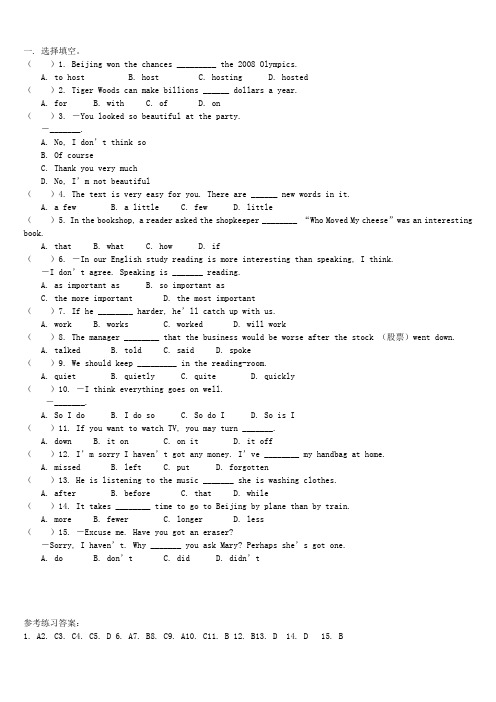
一. 选择填空。
()1. Beijing won the chances _________ the 2008 Olympics.A. to hostB. hostC. hostingD. hosted()2. Tiger Woods can make billions ______ dollars a year.A. forB. withC. ofD. on()3. -You looked so beautiful at the party.-_______.A. No, I don’t think soB. Of courseC. Thank you very muchD. No, I’m not beautiful()4. The text is very easy for you. There are ______ new words in it.A. a fewB. a littleC. fewD. little()5. In the bookshop, a reader asked the shopkeeper ________ “Who Moved My cheese”was an interesting book.A. thatB. whatC. howD. if()6. -In our English study reading is more interesting than speaking, I think.-I don’t agree. Speaking is _______ reading.A. as important asB. so important asC. the more importantD. the most important()7. If he ________ harder, he’ll catch up with us.A. workB. worksC. workedD. will work()8. The manager ________ that the business would be worse after the stock (股票)went down.A. talkedB. toldC. saidD. spoke()9. We should keep _________ in the reading-room.A. quietB. quietlyC. quiteD. quickly()10. -I think everything goes on well.-_______.A. So I doB. I do soC. So do ID. So is I()11. If you want to watch TV, you may turn _______.A. downB. it onC. on itD. it off()12. I’m sorry I haven’t got any money. I’ve ________ my handbag at home.A. missedB. leftC. putD. forgotten()13. He is listening to the music _______ she is washing clothes.A. afterB. beforeC. thatD. while()14. It takes ________ time to go to Beijing by plane than by train.A. moreB. fewerC. longerD. less()15. -Excuse me. Have you got an eraser?-Sorry, I haven’t. Why _______ you ask Mary? Perhaps she’s got one.A. doB. don’tC. didD. didn’t参考练习答案:1. A2. C3. C4. C5. D6. A7. B8. C9. A10. C11. B 12. B13. D 14. D 15. B。
![[全]人教版八年级英语上册词汇与语法专项训练含答案解析](https://img.taocdn.com/s1/m/8e2399f0ee06eff9aff807a8.png)
人教版八年级英语上册词汇与语法专项训练含答案解析(A) 根据句意及首字母或汉语提示完成单词1.He is very strong because he e______ a lot.2.We wash our hair t______ a week.3.I'm t______. Can you give me something to drink?4. If you are too t______, please lie down and rest.5.I am b______ my sister this evening because my mother is ill.6. I'm going h______ in the mountains next Sunday.7.Thirty m______is half an hour.8.Can you wait for me at the bus s______?9.We are very busy today. We have to s______ for the math test.10.There is going to be a guitarc______ in our school next week.11.He______(旅游) Australia last year.12. Uncle Wang is an______(工程师) in his factory.13. They______(建造) the bridge last year.14. He______(借)some books from me,but never gave them back.15. I like eating vegetables for every______(饭;餐)16. I often go to the______(电影院) on Saturday evening.17. Which is______ (小) the moon or the earth?18. He is a good______(表演者).19. Mike is two years______(更年轻) than his sister。
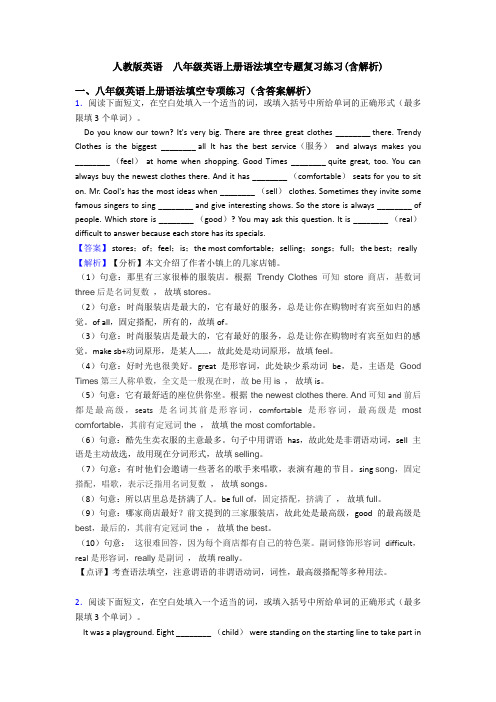
人教版英语八年级英语上册语法填空专题复习练习(含解析)一、八年级英语上册语法填空专项练习(含答案解析)1.阅读下面短文,在空白处填入一个适当的词,或填入括号中所给单词的正确形式(最多限填3个单词)。
Do you know our town? It's very big. There are three great clothes ________ there. Trendy Clothes is the biggest ________ all It has the best service(服务)and always makes you ________ (feel)at home when shopping. Good Times ________ quite great, too. You can always buy the newest clothes there. And it has ________ (comfortable) seats for you to sit on. Mr. Cool's has the most ideas when ________ (sell) clothes. Sometimes they invite some famous singers to sing ________ and give interesting shows. So the store is always ________ of people. Which store is ________ (good)? You may ask this question. It is ________ (real)difficult to answer because each store has its specials.【答案】 stores;of;feel;is;the most comfortable;selling;songs;full;the best;really 【解析】【分析】本文介绍了作者小镇上的几家店铺。
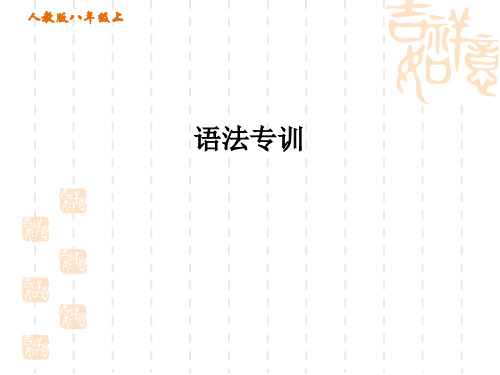
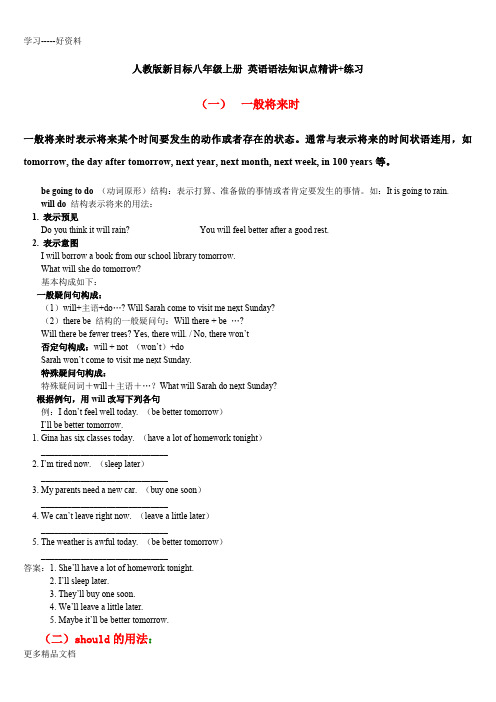
人教版新目标八年级上册英语语法知识点精讲+练习(一)一般将来时一般将来时表示将来某个时间要发生的动作或者存在的状态。
通常与表示将来的时间状语连用,如tomorrow, the day after tomorrow, next year, next month, next week, in 100 years等。
be going to do(动词原形)结构:表示打算、准备做的事情或者肯定要发生的事情。
如:It is going to rain.will do结构表示将来的用法:1. 表示预见Do you think it will rain? You will feel better after a good rest.2. 表示意图I will borrow a book from our school library tomorrow.What will she do tomorrow?基本构成如下:一般疑问句构成:(1)will+主语+do…? Will Sarah come to visit me next Sunday?(2)there be 结构的一般疑问句:Will there + be …?Will there be fewer trees? Yes, there will. / No, there won’t否定句构成:will + not (won’t)+doSarah won’t come to visit me next Sunday.特殊疑问句构成:特殊疑问词+will+主语+…?What will Sarah do next Sunday?根据例句,用will改写下列各句例:I don’t feel well today. (be better tomorrow)I’ll be better tomorrow.1. Gina has six classes today. (have a lot of homework tonight)_____________________________2. I’m tired now. (sleep later)_____________________________3. My parents need a new car. (buy one soon)_____________________________4. We can’t leave right now. (leave a little later)_____________________________5. The weather is awful today. (be better tomorrow)_____________________________答案:1. She’ll have a lot of homework tonight.2. I’ll sleep later.3. They’ll buy one soon.4. We’ll leave a little later.5. Maybe it’ll be better tomorrow.(二)should的用法:should用来提出建议和忠告,后边加动词原形,否定句直接在should后边加not.例如:I think you should eat less junk food.我认为你应该少吃垃圾食品。
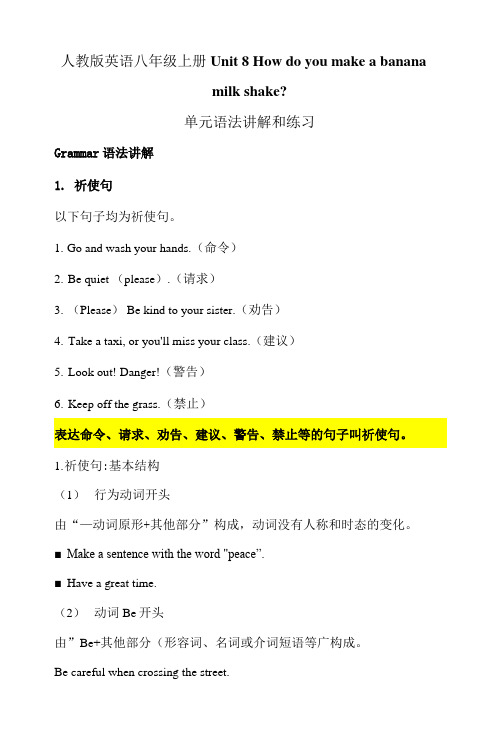
人教版英语八年级上册Unit 8 How do you make a bananamilk shake?单元语法讲解和练习Grammar语法讲解1.祈使句以下句子均为祈使句。
1.Go and wash your hands.(命令)2.Be quiet (please).(请求)3.(Please) Be kind to your sister.(劝告)4.Take a taxi, or you'll miss your class.(建议)5.Look out! Danger!(警告)6.Keep off the grass.(禁止)1.祈使句:基本结构(1)行为动词开头由“—动词原形+其他部分”构成,动词没有人称和时态的变化。
■Make a sentence with the word "peace”.■Have a great time.(2)动词Be开头由”Be+其他部分(形容词、名词或介词短语等广构成。
Be careful when crossing the street.(3)Let开头由“Let+宾语+动词原形+其他部分”(动作执行不包含听话者) 或"Let's+动词原形+其他部分”(动作执行包含听话者在内)构成。
■Let him go back now.Let us try again.(不含听话者)让我们再试一下吧。
■Let's try again.咱们再试一下吧。
祈使句:否定形式(1)行为动词和be开头的祈使句的否定形式为在句首加Never或Don't■Never/Don!t say that again!■Never/Don^ be careless. o(2)Let开头的祈使句■Don't let me go with her tomorrow.=■Let me not go with her tomorrow.可在Let前加Dont,也可在Let后宾格的名词或代词后面加note如果以Let's开头的祈使句,必须在Let's后加not。
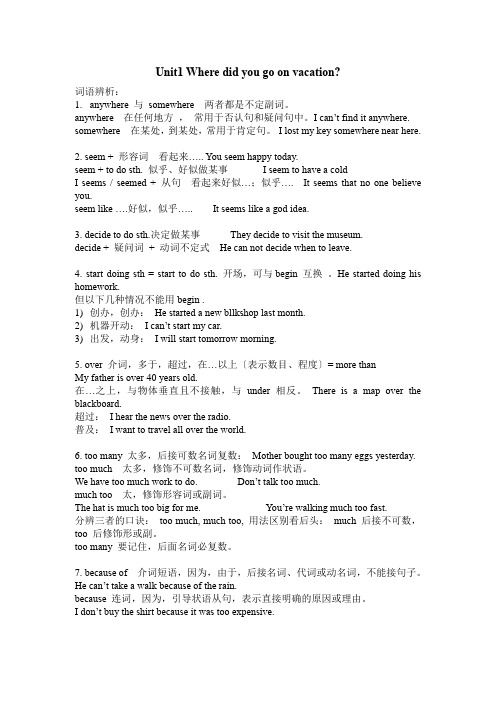
Unit1 Where did you go on vacation?词语辨析:1.anywhere 与somewhere 两者都是不定副词。
anywhere 在任何地方,常用于否认句和疑问句中。
I can’t find it anywhere. somewhere 在某处,到某处,常用于肯定句。
I lost my key somewhere near here.2. seem + 形容词看起来….. You seem happy today.seem + to do sth. 似乎、好似做某事I seem to have a coldI seems / seemed + 从句看起来好似…;似乎…. It seems that no one believe you.seem like ….好似,似乎….. It seems like a god idea.3. decide to do sth.决定做某事They decide to visit the museum.decide + 疑问词+ 动词不定式He can not decide when to leave.4. start doing sth = start to do sth. 开场,可与begin 互换。
He started doing his homework.但以下几种情况不能用begin .1)创办,创办:He started a new bllkshop last month.2)机器开动:I can’t start my car.3)出发,动身:I will start tomorrow morning.5. over 介词,多于,超过,在…以上〔表示数目、程度〕= more thanMy father is over 40 years old.在…之上,与物体垂直且不接触,与under 相反。
There is a map over the blackboard.超过:I hear the news over the radio.普及:I want to travel all over the world.6. too many 太多,后接可数名词复数:Mother bought too many eggs yesterday. too much 太多,修饰不可数名词,修饰动词作状语。
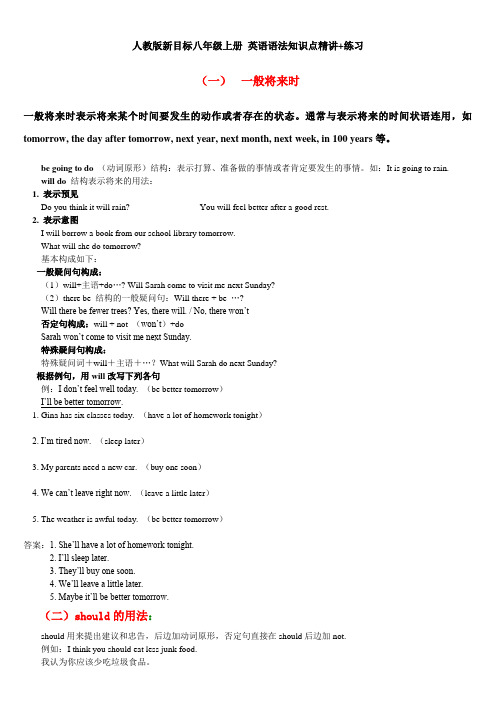
人教版新目标八年级上册英语语法知识点精讲+练习(一)一般将来时一般将来时表示将来某个时间要发生的动作或者存在的状态。
通常与表示将来的时间状语连用,如tomorrow, the day after tomorrow, next year, next month, next week, in 100 years等。
be going to do(动词原形)结构:表示打算、准备做的事情或者肯定要发生的事情。
如:It is going to rain.will do结构表示将来的用法:1. 表示预见Do you think it will rain? You will feel better after a good rest.2. 表示意图I will borrow a book from our school library tomorrow.What will she do tomorrow?基本构成如下:一般疑问句构成:(1)will+主语+do…? Will Sarah come to visit me next Sunday?(2)there be 结构的一般疑问句:Will there + be …?Will there be fewer trees? Yes, there will. / No, there won’t否定句构成:will + not (won’t)+doSarah won’t come to visit me next Sunday.特殊疑问句构成:特殊疑问词+will+主语+…?What will Sarah do next Sunday?根据例句,用will改写下列各句例:I don’t feel well today. (be better tomorrow)I’ll be better tomorrow.1. Gina has six classes today. (have a lot of homework tonight)_____________________________2. I’m tired now. (sleep later)_____________________________3. My parents need a new car. (buy one soon)_____________________________4. We can’t leave right now. (leave a little later)_____________________________5. The weather is awful today. (be better tomorrow)_____________________________答案:1. She’ll have a lot of homework tonight.2. I’ll sleep later.3. They’ll buy one soon.4. We’ll leave a little later.5. Maybe it’ll be better tomorrow.(二)should的用法:should用来提出建议和忠告,后边加动词原形,否定句直接在should后边加not.例如:I think you should eat less junk food.我认为你应该少吃垃圾食品。
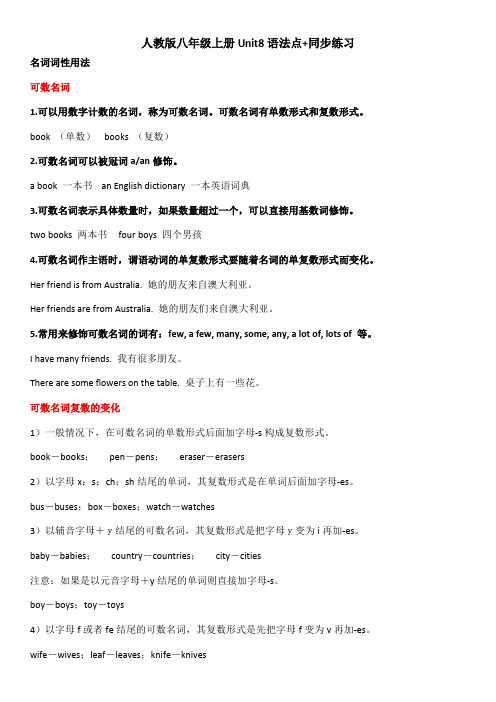
人教版八年级上册Unit8语法点+同步练习名词词性用法可数名词1.可以用数字计数的名词,称为可数名词。
可数名词有单数形式和复数形式。
book (单数) books (复数)2.可数名词可以被冠词a/an修饰。
a book 一本书 an English dictionary 一本英语词典3.可数名词表示具体数量时,如果数量超过一个,可以直接用基数词修饰。
two books 两本书 four boys 四个男孩4.可数名词作主语时,谓语动词的单复数形式要随着名词的单复数形式而变化。
Her friend is from Australia. 她的朋友来自澳大利亚。
Her friends are from Australia. 她的朋友们来自澳大利亚。
5.常用来修饰可数名词的词有:few, a few, many, some, any, a lot of, lots of 等。
I have many friends. 我有很多朋友。
There are some flowers on the table. 桌子上有一些花。
可数名词复数的变化1)一般情况下,在可数名词的单数形式后面加字母-s构成复数形式。
book-books;pen-pens;eraser-erasers2)以字母x;s;ch;sh结尾的单词,其复数形式是在单词后面加字母-es。
bus-buses;box-boxes;watch-watches3)以辅音字母+y结尾的可数名词,其复数形式是把字母y变为i再加-es。
baby-babies;country-countries;city-cities注意:如果是以元音字母+y结尾的单词则直接加字母-s。
boy-boys;toy-toys4)以字母f或者fe结尾的可数名词,其复数形式是先把字母f变为v再加-es。
wife-wives;leaf-leaves;knife-knives5)以字母o结尾的可数名词,其复数形式无生命的加-s,有生命的加-es。
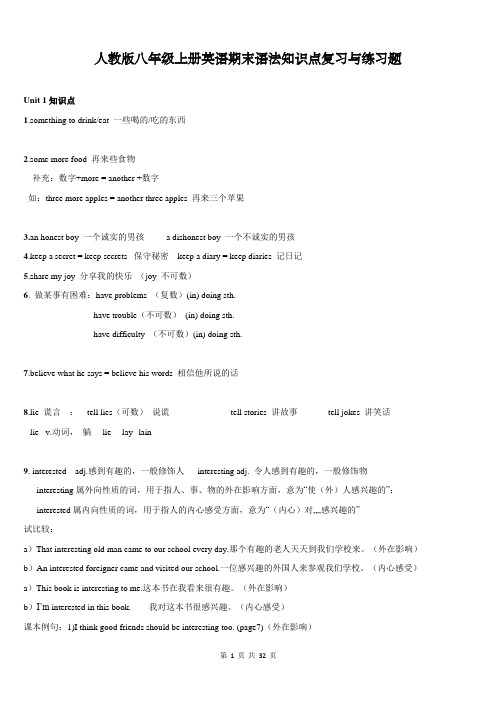
人教版八年级上册英语期末语法知识点复习与练习题Unit 1知识点1.something to drink/eat 一些喝的/吃的东西2.some more food 再来些食物补充:数字+more = another +数字如:three more apples = another three apples 再来三个苹果3.an honest boy 一个诚实的男孩 a dishonest boy 一个不诚实的男孩4.keep a secret = keep secrets 保守秘密keep a diary = keep diaries 记日记5.share my joy 分享我的快乐(joy 不可数)6. 做某事有困难:have problems (复数)(in) doing sth.have trouble(不可数)(in) doing sth.have difficulty (不可数)(in) doing sth.7.believe what he says = believe his words 相信他所说的话8.lie 谎言:tell lies(可数)说谎tell stories 讲故事tell jokes 讲笑话lie v.动词,躺lie ---lay--lain9. interested adj.感到有趣的,一般修饰人interesting adj. 令人感到有趣的,一般修饰物interesting属外向性质的词,用于指人、事、物的外在影响方面,意为“使(外)人感兴趣的”;interested属内向性质的词,用于指人的内心感受方面,意为“(内心)对……感兴趣的”试比较:a)That interesting old man came to our school every day.那个有趣的老人天天到我们学校来。
(外在影响)b)An interested foreigner came and visited our school.一位感兴趣的外国人来参观我们学校。
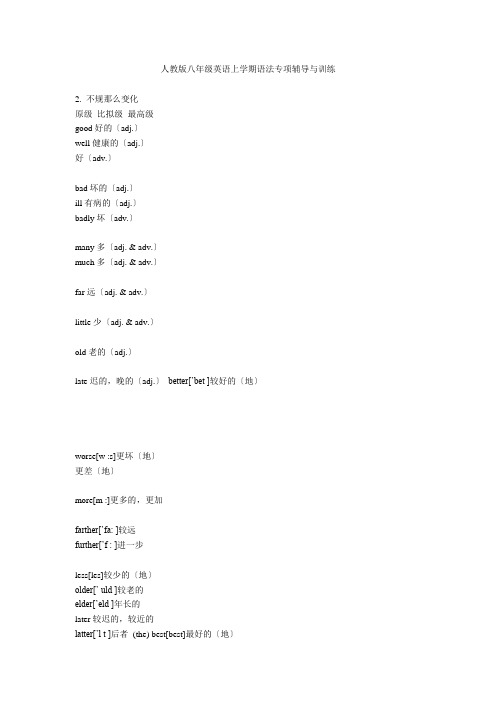
人教版八年级英语上学期语法专项辅导与训练2. 不规那么变化原级比拟级最高级good好的〔adj.〕well健康的〔adj.〕好〔adv.〕bad坏的〔adj.〕ill有病的〔adj.〕badly坏〔adv.〕many多〔adj. & adv.〕much多〔adj. & adv.〕far远〔adj. & adv.〕little少〔adj. & adv.〕old老的〔adj.〕late迟的,晚的〔adj.〕better[’bet ]较好的〔地〕worse[w :s]更坏〔地〕更差〔地〕more[m :]更多的,更加farther[’fa: ]较远further[’f : ]进一步less[les]较少的〔地〕older[’ uld ]较老的elder[’eld ]年长的later较迟的,较近的latter[’l t ]后者(the) best[best]最好的〔地〕(the) worst[w :st]最坏〔地〕最糟〔地〕(the) most[m ust]最多的〔地〕(the) farthest[’fa: ist]最远的〔地〕(the) furthest[’f : ist]最深远的〔地〕(the) least[li:st]最少的〔地〕the oldest[’ uldist]最老的the eldest[’eldist]最年长的the latest〔时间上〕最近的the last〔顺序〕最后的比拟:elder和eldest主要用于表示家庭成员之间的长幼关系,如:elder sister姐姐。
older和oldest那么用于表示年龄大小。
They are in the same age, but Li looks much older than Ma.他们两个在年龄上一般大,但看起来李比马老的多。
二. 形容词比拟等级的用法。
形容词比拟等级通常分为原形,比拟级和最高级三种根本形式,具体而言,它们分别以以下形式出现在句中:〔1〕as +原形+ as 表示“……和……相同〞。
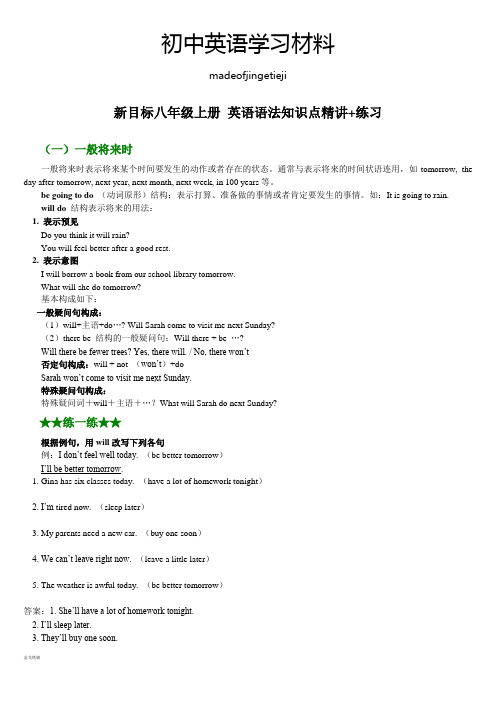
初中英语学习材料madeofjingetieji新目标八年级上册英语语法知识点精讲+练习(一)一般将来时一般将来时表示将来某个时间要发生的动作或者存在的状态。
通常与表示将来的时间状语连用,如tomorrow, the day after tomorrow, next year, next month, next week, in 100 years等。
be going to do(动词原形)结构:表示打算、准备做的事情或者肯定要发生的事情。
如:It is going to rain.will do结构表示将来的用法:1. 表示预见Do you think it will rain?You will feel better after a good rest.2. 表示意图I will borrow a book from our school library tomorrow.What will she do tomorrow?基本构成如下:一般疑问句构成:(1)will+主语+do…? Will Sarah come to visit me next Sunday?(2)there be 结构的一般疑问句:Will there + be …?Will there be fewer trees? Yes, there will. / No, there won’t否定句构成:will + not (won’t)+doSarah won’t come to visit me next Sunday.特殊疑问句构成:特殊疑问词+will+主语+…?What will Sarah do next Sunday?★★练一练★★根据例句,用will改写下列各句例:I don’t feel well today. (be better tomorrow)I’ll be better tomorrow.1. Gina has six classes today. (have a lot of homework tonight)_____________________________2. I’m tired now. (sleep later)_____________________________3. My parents need a new car. (buy one soon)_____________________________4. We can’t leave right now. (leave a little later)_____________________________5. The weather is awful today. (be better tomorrow)_____________________________答案:1. She’ll have a lot of homework tonight.2. I’ll sleep later.3. They’ll buy one soon.4. We’ll leave a little later.5. Maybe it’ll be better tomorrow.(二)should的用法:should用来提出建议和忠告,后边加动词原形,否定句直接在should后边加not.例如:I think you should eat less junk food.我认为你应该少吃垃圾食品。
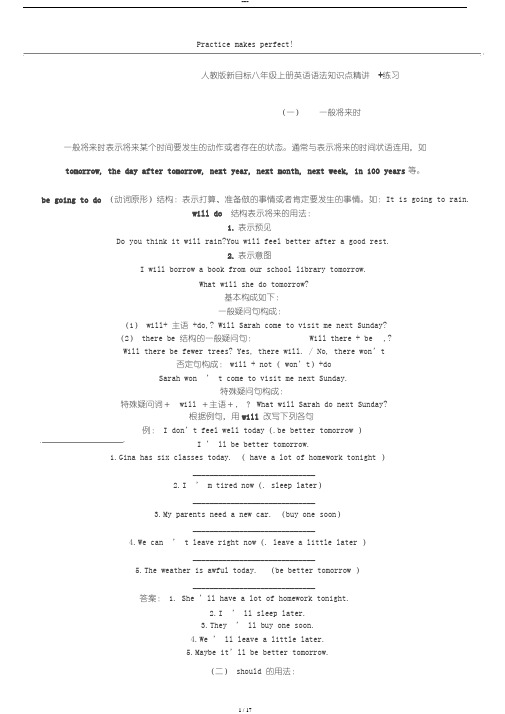
Practice makes perfect!人教版新目标八年级上册英语语法知识点精讲 +练习(一)一般将来时一般将来时表示将来某个时间要发生的动作或者存在的状态。
通常与表示将来的时间状语连用,如tomorrow, the day after tomorrow, next year, next month, next week, in 100 years等。
be going to do (动词原形)结构:表示打算、准备做的事情或者肯定要发生的事情。
如:It is going to rain.will do 结构表示将来的用法:1.表示预见Do you think it will rain?You will feel better after a good rest.2.表示意图I will borrow a book from our school library tomorrow.What will she do tomorrow?基本构成如下:一般疑问句构成:(1) will+ 主语 +do,? Will Sarah come to visit me next Sunday?(2) there be 结构的一般疑问句:Will there + be ,?Will there be fewer trees? Yes, there will. / No, there won’t否定句构成:will + not( won’t)+doSarah won ’ t come to visit me next Sunday.特殊疑问句构成:特殊疑问词+ will +主语+, ? What will Sarah do next Sunday?根据例句,用will 改写下列各句例: I don’t feel well today(.be better tomorrow )I ’ ll be better tomorrow.1.G ina has six classes today. ( have a lot of homework tonight )_____________________________2.I’ m tired now(. sleep later)_____________________________3.M y parents need a new car. (buy one soon)_____________________________4.W e can ’ t leave right now(. leave a little later )_____________________________5.T he weather is awful today. (be better tomorrow )_____________________________答案: 1. She ’ll have a lot of homework tonight.2.I’ ll sleep later.3.T hey ’ ll buy one soon.4.W e ’ ll leave a little later.5.M aybe it’ll be better tomorrow.(二) should 的用法:should 用来提出建议和忠告,后边加动词原形,否定句直接在should 后边加 not.Practice makes perfect!例如: I think you should eat less junk food.我认为你应该少吃垃圾食品。
人教版八年级英语上学期语法专项辅导与训练语法专项II. 名词:在我们身边存在着形形色色的人和事物,它们都有自己的称呼,我们用来称呼它们的词就是名词,概括来说表示人、事物、地方、现象等的名称的词都叫名词。
一. 名词的种类:名词可以分为专有名词和普通名词,普通名词又分为个体名词和集体名词,物质名词和抽象名词。
1. 专有名词:专有名词是指人、地方、团体、机构等特有的名词,它的第一个字母必须大写,专有名词前一般不加冠词。
A. 表示人名:Li Bai,Mr Black,Doctor ZhangB. 表示地名:China,London,Zhong Guan Cun Street.C. 由普通名词构成的专有名词:the Spring Festival, the Palace Museum.2. 普通名词:普通名词指一类人或东西或一个抽象的名标,它可以进一步分为个体名词、集合名词、物质名词和抽象名词四类。
A. 个体名词:表示某类人或事物中的个体:student,teacher,car.B. 集合名词:表示若干个体组成的集合体;family,police,people.C. 抽象名词:表示动作、状态、品质、感情等抽象的概念:music,loveD. 物质名词:表示无法分为个体的物质或实物:water,tea,air二. 名词的数:表示可以计算数目的人或物称为可数名词,表示一个用单数,两个以上用复数,可数名词单数前面一般要用不定冠词a / an,可数名词复数是在单数名词后面加“s”或“es”。
可数名词复数前不能用不定冠词a / an。
1. 单数可数名词,表示“一”的概念,要用名词的单数形式,表示名词的单数,要在名词前加冠词a或an。
eg:a book,a tree,a sharkan octopus,an apple,an egg2. 复数可数名词:在英语中,如果要表示“二、三、四,……”概念时,要用名词的复数形式,名词的复数形式是在单数名词后加上词尾-s或-es构成的。
A. 名词复数的规则变化。
a. 在一般情况下,词尾后加-s。
books,cups,beds,boys,horsesb. 以s,x,sh,ch结尾的词,词尾加-es,读|iz|buses,boxes,dishes,watchesc. 以f或fe结尾的词,先将f或fe变成v,再加-es,读|vz|half—halves,knife—knivesd. 以o结尾的词,词尾加-es或-s。
zoos,photos,radios,tomatoes,potatoese. 以辅音字母加y结尾的词,先将y改为i再加-es。
cities,families,babiesB. 名词复数的不规则变化。
man—men,tooth—teeth,child—children,sheep—sheepC. 有些名词只有复数形式clothes,trousers,pants,glassesII. 不定代词,我们所学的不定代词有all,both,each,every,some,any,many,much,(a)few,(a)little,either,neither,other,another,no,none以及含有some-,any-,no-等的合成代词,这些不定代词大都可以代替名词和形容词,在句中作主语、宾语、表语和定语。
一. some,any及其合成词的用法。
1. 基本用法some,any可与单、复数和不可数名词连用。
some用于肯定句中,而不能用于疑问句中,any一般用于否定句,疑问句和条件句中。
eg:I have some interesting books.There is some yogurt in the bottle.I don’t have any money.Were there any sharks in the aquarium?2. 特殊用法在疑问句中,一般不用some,只有当问句表示一种邀请或者请求,或期待一个肯定的回答时才能用some。
eg:Would you like some more tea?二. all,both的用法1. all代表或修饰四个以上的人或事物,或不可数的东西。
eg:We all like eat potato chips.All the students in our class went to the zoo.2. both是指“两者都……”eg:The twins both have long hair.There are many trees on both sides of the street.三. many,much,(a lot),a few,few,a little,little。
这些词都可以表示数量,并且都可以修饰名词。
1. many,a lot,a few,few修饰可数名词;much,a lot,a little,little修饰不可数名词。
2. many,much,a lot,a few,a little表示肯定的意思:few,little表示否定的意思。
eg:How much relish do we need?There are a few minutes left, aren’t there?There is a little time left, is there? III. 形容词的比较等级:英语中的形容词,在表示“比较——”和“最——”这样的概念时,要用特别的形式,称为比较级和最高级。
原级比较级最高级young(年轻)younger(比较年轻)youngest(最年轻)一. 变化形式如下:1. 规则变化构成法原级比较级最高级一般单音节词和部分双音节词在词尾加-er[](比较级)和-est[ist](最高级)以不发音的e结尾的单音节词和少数以le结尾的双音节词只在词尾加-r(比较级)和-st(最高级)“辅音字母+y”结尾的双音节词,将词尾的y改为i,再加-er和-est重读闭音节词,只有一个辅音字母结尾时,要双写该辅音字母,再加-er,-est部分双音节词和多音节词,在该词前面加more和the most构成比较级和最高级tall高的fast快(adj.& adv.)near附近的(adj. & adv.)nice好的(adj.)large大的(adj.)able有能力的(adj.)late晚,晚的(adj. & adv.)easy容易的(adj.)busy忙的(adj.)early早(adj. & adv.)big大的(adj.)hot热的(adj.)thin细的,瘦的(adj.)important重要的(adj.)beautiful漂亮的(adj.)slowly慢(adv.)quickly快(adv.)teller greaterfasternearernicerlargerablerlatereasierbusierearlierbiggermore important more beautifulmore slowlymore quicklythe tallestthe greatest(the)fastest (the)nearestthe nicestthe largestthe ablest(the)latestthe easiestthe busiest(the)earliestthe biggestthe hottestthe thinnestthe most important the most beautiful (the) most slowly (the) most quickly 2. 不规则变化原级比较级最高级good好的(adj.)well健康的(adj.)好(adv.)bad坏的(adj.)ill有病的(adj.)badly坏(adv.)much多(adj. & adv.)far远(adj. & adv.)little少(adj. & adv.)old老的(adj.)late迟的,晚的(adj.)better[’bet ]较好的(地)worse[w :s]更坏(地)更差(地)more[m :]更多的,更加far ther[’fa: ]较远further[’f : ]进一步less[les]较少的(地)older[’ uld ]较老的elder[’eld ]年长的later较迟的,较近的latter[’l t ]后者(the) best[best]最好的(地)(the) worst[w :st]最坏(地)最糟(地)(the) most[m ust]最多的(地)(the) farthest[’fa: ist]最远的(地)(the) furthest[’f : ist]最深远的(地)(the) least[li:st]最少的(地)the oldest[’ uldist]最老的the eldest[’eldist]最年长的the latest(时间上)最近的比较:elder和eldest主要用于表示家庭成员之间的长幼关系,如:elder sister姐姐。
older和oldest则用于表示年龄大小。
They are in the same age, but Li looks much older than Ma.他们两个在年龄上一般大,但看起来李比马老的多。
二. 形容词比较等级的用法。
形容词比较等级通常分为原形,比较级和最高级三种基本形式,具体而言,它们分别以下列形式出现在句中:(1)as +原形+ as 表示“……和……相同”。
(2)比较级+ than 表示“……比……较为……”。
(3)the +最高级+ of / in 表示“在……中最为……”。
eg:My dog is as old as that one.The jacket is as cheap as that old one.Is he as busy as before?Mary is funnier than Jane.His brother is younger than me.Tom is the happiest of us all.Spring is the best season of the year.三. 需要注意的一些问题。
1. 在形容词比较级前还可以用much,even,far,a lot,still,a little来修饰,表示“……的多”,“甚至……”,“仍然,还……”,“更……”,以加强语气。
eg:Our city is much more beautiful than yours.Japan is a little larger than Germany.2. 表示“大几岁”,“高……”等,句型用“表示数量的词+形容词比较级。